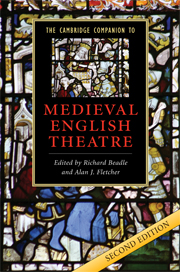Book contents
- Frontmatter
- 1 An introduction to medieval English theatre
- 2 The theatricality of medieval English plays
- 3 The cultural work of early drama
- 4 The York Corpus Christi Play
- 5 The Chester cycle
- 6 The Towneley pageants
- 7 The N-Town plays
- 8 The non-cycle plays and the East Anglian tradition
- 9 Morality plays
- 10 Saints and miracles
- 11 Modern productions of medieval English drama
- 12 A guide to criticism of medieval English theatre
- Select bibliography
- Author index to the bibliography
- General index
1 - An introduction to medieval English theatre
Published online by Cambridge University Press: 28 November 2011
- Frontmatter
- 1 An introduction to medieval English theatre
- 2 The theatricality of medieval English plays
- 3 The cultural work of early drama
- 4 The York Corpus Christi Play
- 5 The Chester cycle
- 6 The Towneley pageants
- 7 The N-Town plays
- 8 The non-cycle plays and the East Anglian tradition
- 9 Morality plays
- 10 Saints and miracles
- 11 Modern productions of medieval English drama
- 12 A guide to criticism of medieval English theatre
- Select bibliography
- Author index to the bibliography
- General index
Summary
In 1955, two books on early English drama were published. One, Hardin Craig's English Religious Drama of the Middle Ages (36), was thought to be the summation of all that could be known about the subject. The second, F. M. Salter's Medieval Drama in Chester (241), struck off in an entirely new direction. Salter's fresh approach to external evidence for the drama – that is, not the play texts themselves, but evidence for play production and dramatic activity in municipal and guild records – coupled both with new scholarly editions of all the surviving play texts and with modern productions of these plays, have, fifty years later, revolutionised our understanding of dramaturgy from the late fourteenth century to the late sixteenth century. The fruits of this new understanding are reflected in the essays that follow, the majority of which are naturally concerned, in the main, with the surviving canon of medieval English dramatic texts. This introduction is intended to outline the religious and social context in which that drama had its being.
The beginnings
Although intensive research over the last few decades has clarified much about late medieval drama in Britain and Ireland, its origins and relationship to the liturgical mimetic ceremonies that preceded it and to the entertainment patterns of classical antiquity remain an area of scholarly uncertainty and contention. The old theories argued an evolution along Darwinian lines from mimetic tropes associated with the Mass, to representational Latin plays on religious themes, to a vernacular religious drama performed by the laity that became increasingly secularised until it finally yielded to the polemic drama of the sixteenth century. Such theories will not stand in the face of our increasingly sophisticated understanding of western medieval culture and the cross currents of the politics and theology of the western Church.
- Type
- Chapter
- Information
- The Cambridge Companion to Medieval English Theatre , pp. 1 - 25Publisher: Cambridge University PressPrint publication year: 2008
- 1
- Cited by



